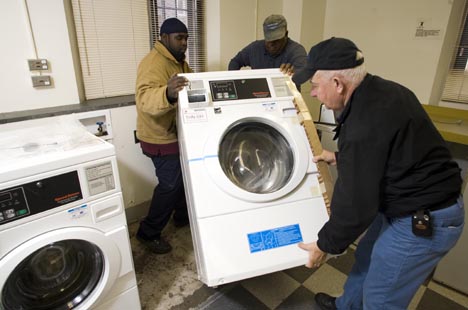Dirty Laundry: A Fact of Life, Even During Drought
New energy efficient washers in Duke dorms expected to save millions of gallons of water each year

The laundry room in HH Residence Hall on West Campus was filled to capacity with new and used washing machines. As six existing washers were removed, James Bragg, a vending and concessions department coordinator with Duke Stores, shifted six new water-efficient washing machines into place, quickly connecting hoses and wires.
"It's a big project, but it's worth it because these new washers will save a lot of water," said Maynard Childress, manager of vending operations for Duke Stores.
As part of Duke's ongoing commitment to water conservation and other sustainable practices, the university is installing 200 new Speed Queen ultra high-efficiency washers in residence halls. Not only are they more convenient because they accept DukeCards, but the change is expected to help Duke save an estimated three million gallons of water annually, Duke officials said.
"These new ultra efficient washers will enable students who live in residence halls to reduce the amount of water and electricity used for laundry," said Jim Wilkerson, director of trademark licensing and operations for Campus Services' Duke Stores, which is leading the project with the assistance of Residence Life and Housing Services. "The entire Duke community is concerned about the drought and dedicated to conserving water in every possible way."
Some of Duke's existing washers were scheduled for replacement in coming years, but the timeframe was moved up because of the drought.
"With the drought expected to continue, it was vital to act promptly," Wilkerson said. "Since these old washers are being replaced 2½ years before their normal replacement time, we used them as a trade-in to lower the cost of the new washers."
The new frontload washers are large capacity and meet the Energy Star requirements for efficiency. They use 14 gallons per load -- 50 percent less than the previous machines.
One major difference is that the new washers don't submerge clothes in water during the rinse cycle. Instead, water is showered onto clothes as they spin during the rinse cycle. The process provides cleaner laundry with less water and requires less drying time because clothes are spun almost dry, according to Speed Queen's website.
Students are praising the dozens of the new washers that already have been installed on West Campus.
"Our students are very supportive of efforts to reduce water consumption," said Eddie Hull, dean of Residence Life and executive director of Housing Services.
Hull and other Duke administrators are working with the Campus Council and members of the residential student body to identify effective ways to conserve water. Those discussions prompted the decision to install new washers.
"Our students understand the seriousness of the current drought situation, and many of their suggestions are prompted by these circumstances," Hull said. "There is a growing awareness about the need to conserve water and that student behavior can have a significant impact on this issue."
Other water-saving initiatives are also underway in residence halls. During the past two months, 1,500 low-flow shower heads and 1,700 hand sanitizer dispensers have been installed in Duke's residence halls. Plumbers with Duke's Facilities Management Department are also in the process of installing low-flow flush valves on residence hall toilets.
"Overall, we are estimating the annual water savings will be approximately 15 million gallons," Hull said. "That's definitely a big drop in the bucket."